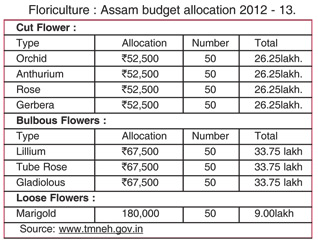Archives
BLOOMING FLORICULTURE
An unmarried, self-employed and an unplanned entrant into the floriculture venture - the most colourful component of the horticulture segment as his livelihood opportunity, Naren's bicycle stops at the doorsteps of over 160 regular customers every day who purchase his flowers for offerings to their morning deities. He also has been able to steadily add to his number of regular customers applying his simple business trick of maintaining regularity and keeping a low price which he collects at the end of the month. The rapid expansion of the capital city, the ever increasing population and enhancement of their disposable income level has helped Naren's business grow steadily.
I try my best to deliver the small poly packs of fresh flowers in every household early in the morning. I leave home at 4.30 a.m. and reach Guwahati by 5.30 a.m. and immediately take my bicycle that I keep in a house in Paltan Bazar area, the owner of which is also my customer to distribute the flower packets at the earliest. I cover all 160 customers within two and half hours, says Naren. His charge is only `200/ per family, per month. Thus, at the end of the month, he earns `16,000/, after making payments to local flower growers from whom he has to purchase the flowers.
Naren is among about 300 youth from Hajo, who deliver fresh flowers to Guwahati residents, a new livelihood opportunity created by diminishing space for homestead flower gardens
| People have started placing orders for exquisite flower decorations at different public functions, hall programmes, seminars, and even for birthday parties. And there is no dearth of such occasions in a city with a population of over 18 lakh. |
in a city that is growing rapidly, both horizontally and vertically. The space for home grown flowers is inversely proportional to the growth of the concrete jungle. The number of residents looking for fresh flowers on the other hand is directly proportional to the rapid expansion of the city.
The business is, as claimed by Naren, a simple one with very little investment and without the disturbance of a middleman. Also, it is steadily growing. Each of these youths has their demarcated area, apartments and individual households to which they deliver fresh flowers for morning worship. From Hajo they come in small vehicles to Paltan Bazar area of the city and from there they take their own bicycles which they keep in different houses paying a nominal rent.
Does his business make him happy? Certainly, I studied only up to Class X. I think what I earn today is quite reasonable as compared to my education. I need not have to bribe anyone, invest in anything, take loans from financial institutions, and my earning is simply growing steadily, he adds.
They reach their villages at around 12.30 p.m. and rest before going out to collect flowers for the next day.

While rapid expansion of Guwahati has given Naren a safe space to earn happily through indigenous floriculture venture, it has also helped professional entrepreneurs like Aanad Kumar Jain, owner of a state of the art showroom Green Petal's with an air-conditioned environment for commercial and exotic flower decoration and storage, in Fancy Bazar area of the capital city to go for diversification of his business. From his traditional flower business of artificial and natural flower arrangement and marriage decorations he is now moving onto online marketing and taking assignments of flower decoration in gorgeous public functions, parties and others both government and private, in and outside the state.
Earlier, floriculture was a seasonal business and our business too was limited to the sale of dry and natural bouquets and decorating marriages and other programmes during such seasons. We also had some particular events like Valentine Day or Teachers Day for selling of our products. But now, the floriculture market is extremely diversified and we are getting contracts round the year, he says.
People have started placing orders for exquisite flower decorations at different public functions, hall programmes, seminars, and even for birthday parties. And there is no dearth of such occasions in a city with a population of over 18 lakh.
Trishna Das, Manager, Green Petals says that the cost of flower decoration for such events may vary according to the budget of the customer. Sharing one of her recent experience she says they got an assignment of decorating a marriage ceremony that costs `38,000 in Dimapur.
she says they got an assignment of decorating a marriage ceremony that costs `38,000 in Dimapur.
Trishna is also happy with the growing trend of local availability of ornamental flowers having market demands including roses, orchids, lillium, gerbera and ornamental leaf.
In many flower showrooms like Green Petals in Guwahati, the buyers get the opportunities of going through a range of customized flower decorations on computer screens before they pick up beautiful flowers for home decorations or bouquets for gifts and parties.
Till some years back, entrepreneurs engaged in the flower business had to depend completely on the outside markets like Kolkata, Siliguri and Bangalore for fresh flowers. Fortunately, most of the species of the cut flowers, loose flowers and bulbous flowers having high market demand are now available locally to a large extent. However, the market is yet to flourish to its potential, Trishna feels. When we talk about flower, we refer to love, peace and tranquility. The rapid expansion of commercial and professional life has made life of commoners exhausted. I believe this is also one of the reasons behind the flourishing of the flower market she says. The city has over 50 such showrooms doing flower business.
The ever increasing demand for flowers in urban growth centres has also propelled growth in a number of commercial flower growers in Assam and other northeastern states. Mr. Khagen Sharma, a senior official at the department of Horticulture says that the number of commercial anthurium nurseries in the state recorded only 380 during 2005-06, but now has gone up to 2,250 during 2007-08, showing a magnificent growth. During this period, the number of orchid nurseries too has increased from 500 to 1,750. According to statistics available with the department, total nursery of commercial gerbera cultivation was 400 during 2008-09.
| Although the Horticulture Mission for north east and Himalayan states was initiated during 2010 with specific guidelines for promotion of horticulture products including floriculture, no allocation was made in the Annual Budgets of Assam for floriculture sector from 2009-10 to 2011-12. |
Despite such tremendous growth of flower growers to meet the demand of the commercial flower markets, budget allocation for floriculture for Assam during 2007-08 was only `1.94 Crore, which increased to 9.32 Crore during 2008-09.
Although the Horticulture Mission for north east and Himalayan states was initiated during 2010 with specific guidelines for promotion of horticulture products including floriculture, no allocation was made in the Annual Budgets of Assam for floriculture sector from 2009-10 to 2011-12.
Now, there is steady budget flow during 2012-13, Sharma says. Accordingly, the Department of Horticulture is planning to provide financial assistance of `52,500 each to 50 growers engaged in different sectors of cut flowers including orchid, anthurium, rose, and gerbera with a total cost of 1.05 Crore; `67,500 each to 50 growers engaged in different sectors of bulbous flowers including lillium, tube rose, gladiolus and `18,000 each to 50 growers engaged in marigold cultivation.
